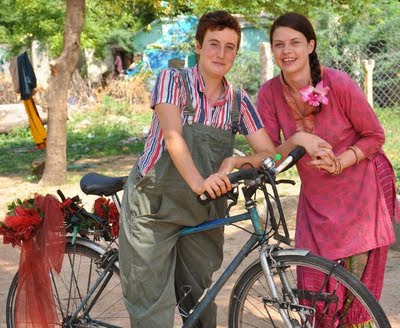They traverse miles to light up a smile
Rebecca Buchanan, dressed in a pink salwar, comes out to greet us along with her friend Tillodore Wilton alias Tilly. Tilly, a farmer from Glasgow, has been on the move since March to raise awareness of environmental issues. She started from the symbolic Heathrow in London, where many a journeys take off – almost daily. Only difference, however, is that, she took off on a bicycle.
Pedalling till Dover and taking a ferry over the English Channel to Calais in France, Tilly has cycled through Belgium, Luxembourg, Germany, Austria, Slovenia, Croatia, Bosnia, Albania, Kosovo, Montenegro, Macedonia, Greece, Turkey, Iran, UAE and finally into India after 9000 kilometres of riding.
“I had to fly into India, since the monsoon had struck Dubai and no ships would have me aboard,” says the anthropology graduate who is against flying due its environmental ill-effects.
On her way, Tilly met farmers to promote organic farming and labour intensive techniques, which according to her is the best method of farming. Landing in Bangalore, she headed to Koppal district to learn ‘Kinnal craft', an indigenous art form of Kinnal in Karnataka.
Tilly came down to Devarayaneri to join Rebecca in learning about the Narikurava culture. “It's very exciting to meet the Narikuravas. Their community structures are distinct from other communities that surround them. We swap stories about the challenges faced in everyday lives ,” says Tilly, who is heading back to Karnataka to learn more about handicraft making. Rebecca, who has been living here for three months, is involved in documenting the Narikurava culture and spreading awareness on their needs. Developing communication skills of teachers and bringing out the creative side of children through soft skills and art are her goals.
The University of Glasgow graduate, hailing from a gypsy community, is one of the few from her community to have completed college. She has devoted herself to social causes . She had taken care of children in Germany, worked at an orphanage in Cambodia and at an anganwadi in Jaisalmer, Rajasthan.
She draws parallels between her community and the Narikuravas, “Both are either nomadic or semi-nomadic, always on the move,” she reckons. On the education scenario she says, “Thirty five per cent of the gypsies would be literate as compared to the 50 odd per cent here.”
There is one major cause of the Narikurava's both Rebecca and Tilly is backing. “They should be given the scheduled tribe (ST) status as there is still inequality and discrimination, says Rebecca. “I was travelling with a Narikurava and the bus conductor refused to halt at our bus stop despite repeated pleading from both of us,” said Rebecca to buttress her argument.
They are also contemplating to launch an online signature campaign to build a strong case for including the Narikuravas under the Scheduled Tribes. Just as the Narikuravas, who are not bounded by the limits of time and space in their search for livelihood, there is a sense of limitlessness that characterises kTilly and Rebecca as they tread along the path to discover more about cultures and diversity.
Sources: The Hindu News Paper




Comments
Post a Comment